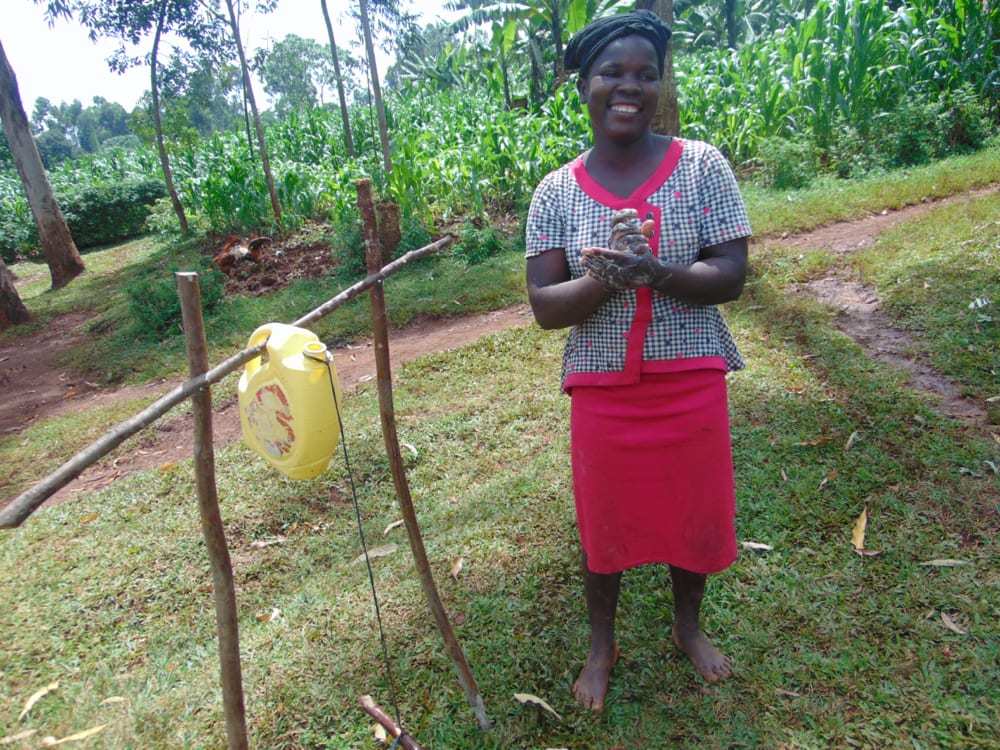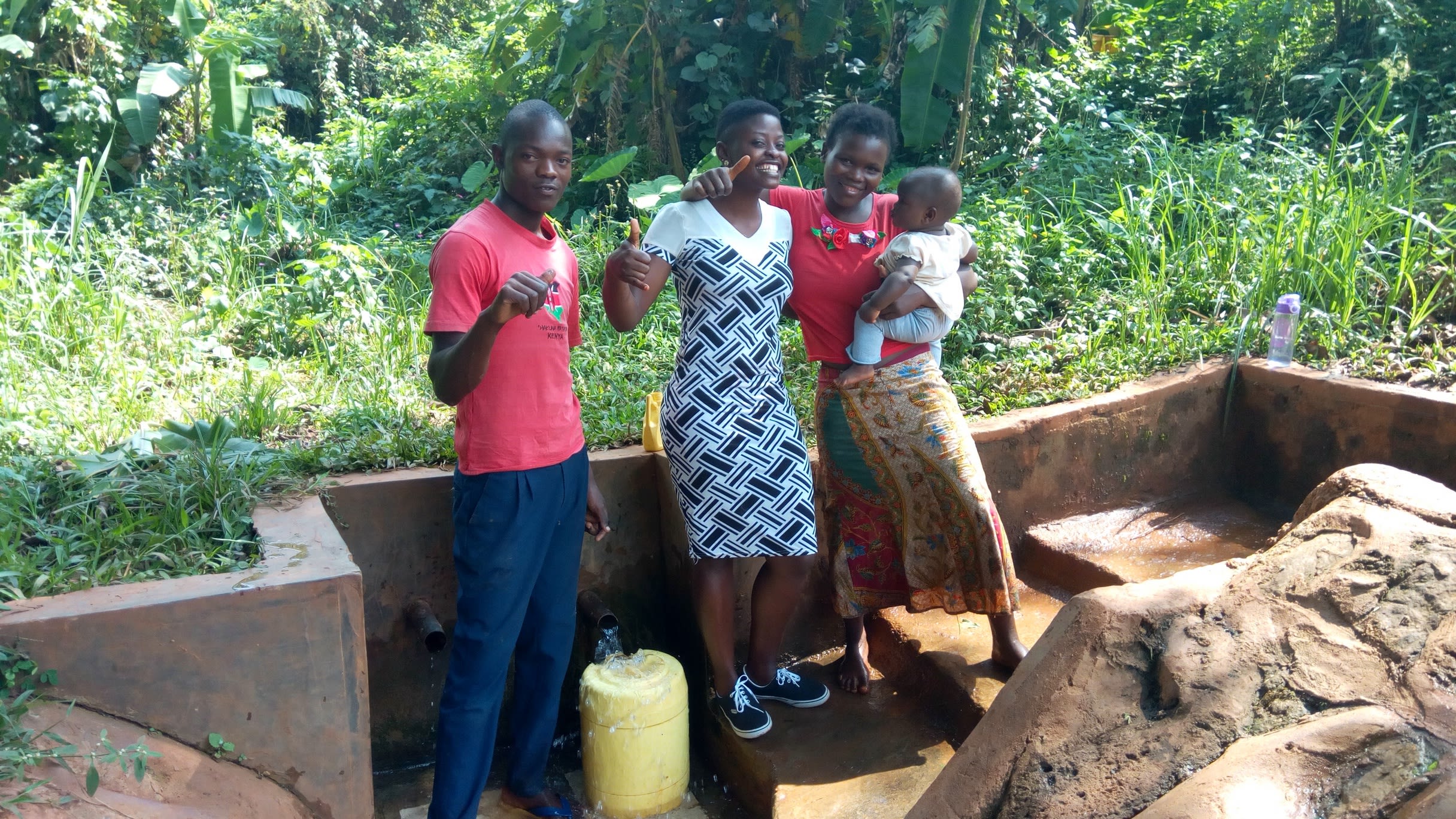This project is a part of our shared program with Western Water and Sanitation Forum (WEWASAFO). Our team is pleased to directly share the below report (edited for clarity, as needed).
Welcome to the Community
Munzakula Village is home to 840 people from about 120 different families.
(Editor's Note: While this many people may have access on any given day, realistically a single water source can only support a population of 350-500 people. This community would be a good candidate for a second project in the future so adequate water is available. To learn more, click here.)
A normal day begins early in the morning to get daily chores done before the heat. The first things to do are collection activities; fetching water and firewood for meals that day. Many women continue collecting firewood to sell in the local market. Other men and women go to the Nyayo Tea Zone to work in others' fields as casual laborers. Some community members have their own small pieces of land where they farm, but most of the yield is used for their own families. The major crops are maize, beans, and avocados.
There are also a number of university students living in this area, so many families focus on providing services or commodities that the students need. Some people in the area have even added on to their homes so they can house tenants.
Water Situation
A handful of families are connected to piped water, but the water is irregular. There is a piped point that charges five shillings per 20-liter jerrycan, but it is only open during the morning and evening. Because of the hundreds living around the water point, it's not possible for everyone to get what they need. Instead of waiting in line, many women must either draw water from an unprotected spring or walk to the next community to access a protected spring.
The unprotected spring is named after its landowner, Mr. Musonye, and is the most convenient water source. However, a visit confirmed that the water is dirty because it is open to many different contaminants. People fetching water from Musonye Spring must wade into the water to fill their containers. Many of the neighboring families do not have their own latrines, so there is a high chance that waste from open defecation washes into the water when it rains. Animals drink from the same source.
After drinking water from Musonye Spring, people complain of cholera, typhoid, bilharzia and diarrhea. A safe water shortage in this community is a huge cause of poverty, since the community members must waste a lot of time searching for water to fetch or buy. And when dirty water is sourced, even more money and time is wasted to treat consequential waterborne diseases.
Sanitation Situation
More than half of households have their own pit latrine, but that leaves at least a quarter without one. There's also a handful of homes that do not have helpful tools like dish racks or clotheslines to safely dry their belongings up off the ground. Even more distressing, very few families have a hand-washing station to wash up after using the latrine, handling waste, or before cooking.
Mr. Musonye told us "the current health situation is pathetic and in wanting, for most members have had many hospital visits to treat typhoid. This is an indicator of poor hygiene and thus unclean water, but we thank you so much for hearing our plea and coming to our rescue. We are ready to work with you to make the project successful."
Plans: Hygiene and Sanitation Training
Community members will attend hygiene and sanitation training for at least two days. This training will ensure participants are no longer ignorant about healthy practices and their importance. The facilitator plans to use PHAST (Participatory Hygiene and Sanitation Transformation), CLTS (Community-Led Total Sanitation), ABCD (Asset-Based Community Development), group discussions, handouts, and demonstrations at the spring.
Training will also result in the formation of a committee that will oversee operations and maintenance at the spring. They will enforce proper behavior around the spring and delegate tasks that will help preserve the site, such as building a fence and digging proper drainage.
Plans: Sanitation Platforms
On the final day of training, participants will select five families that should benefit from new latrines.
Training will also inform the community and selected families on what they need to contribute to make this project a success. They must mobilize locally available materials, such as bricks, clean sand, hardcore, and ballast. The five families must prepare by sinking a pit for the sanitation platforms to be placed over. All community members must work together to make sure that accommodations and food are always provided for the work teams.
Plans: Spring Protection
Fetching water is predominantly a female role, done by both women and young girls. Protecting the spring and offering training and support will therefore help empower the female members of the community by giving them more time and efforts to engage and invest in income-generating activities.
In addition, protecting the spring will ensure that the water is safe, adequate and secure. Construction will keep surface runoff and other contaminants out of the water. Mrs. Lumumba Lusire said, "I thank God for linking us to this office. Knowing what you do and accepting our request as Munzakula Village is the greatest privilege and gift we have received this new year. I am happy because my community will have accessible, affordable, available and safe, clean water. They will be able to eradicate illness and diseases caused as a result of unclean water."



 Rehabilitation Project
Rehabilitation Project






























